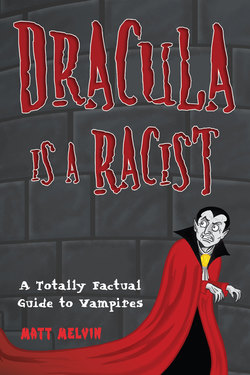Читать книгу Dracula Is a Racist: - Matt Melvin - Страница 7
На сайте Литреса книга снята с продажи.
A Brief Introduction
ОглавлениеReturning from the grave. Supernatural powers. Belief in the paranormal. With such inconceivable ideas, it’s irrational to think a figure such as Jesus Christ could actually exist. But he does. Such is the predicament for vampires. Like the belief in Jesus, the belief in vampires has been in a steady decline for the past couple of centuries. This can be largely attributed to Hollywood spreading its perception of the fictional vampire: refined English gentlemen who wear long, fancy capes and frilly, ruffled shirts or devil worshippers who wear eyeliner and listen to nothing but Swedish death metal.
The latter group has actually spawned a subculture of angsty teenagers with a penchant for black clothing. These kids have very few friends and claim to refuse to interact with other people because they despise humans, regardless of the fact that they hang out in groups at the mall all day judging people. They even refer to themselves as vampyres—spelled with a y. Vampyres aren’t real vampires, though; just like womyn aren’t real lesbians.
As much as they may argue against it, this way of life is really nothing more than a fashion trend. In fact, to continue the charade, some go as far as to have dental work to have caps attached to their teeth so it looks like they have actual vampire fangs. Like, oh my God, these guys are seriously such total posers.
With these laughable misconceptions becoming part of our daily lives, it’s no wonder that the belief in real vampires has been dwindling. Dracula, for example, is easily the most well-known vampire of all time, but most people are completely unaware that he actually exists, much less that he’s a seething racist.
The truth about vampires has been replaced with fanta-sized visions of high-budget theatrics and special effects. Sure, huge explosions may look cool, but real vampires don’t burst into a bright cloud of ash and smoke when stabbed in the heart with a stake. Real vampires don’t all have aristocratic, foreign accents. Real vampires hate My Chemical Romance. And believe me, vampires definitely are real.
So what is a vampire? In simple terms, a vampire is a type of revenant, a being believed to have returned from the grave. Like a zombie except way more cool, a fact that will be pointed out several times throughout this book. The term comes from the French and Latin revenir, meaning “to return” or “to be bitten by a Goth asshole” (figure 1). These specific revenants have various qualities that set them apart from the others. Vampires are seductive, intelligent, artfully sly; do not act on pure impulse; and don’t smell like a pile of decomposing flesh, making them the most dangerous and frightening of all the undead.
Figure 1. “Dick!”
Part of the fear and fascination with these beings comes from the mystery behind them. Just the thought of the un-dead brings up several questions on life and death, such as:
What happens to people when they die?
Does God exist?
Is there such a place as Heaven or Hell?
Does masturbating on an airplane qualify you for the mile-high club?
Who let the dogs out?
None of these questions can be answered with any sort of certainty, especially when combined with the conflicting views from various religions, faiths, and Baha Men from around the world. We are, however, able to gather information relating to vampirism in order to better inform ourselves on the subject.
Everything contained in these pages is undisputed fact, culled from centuries of research, scientific experimentation, firsthand accounts, documentary evidence, and a wide collection of fictional works on the subject. While there is no such thing as a certified vampire historian or scientist (the title simply just does not exist), your author, who sometimes slips into the third person, is as close to being one as possible.1
Whether you want to learn how to better protect yourself from a vampire attack, are interested in training to hunt vampires, actually want to become a vampire yourself, or have recently been turned into one, the information contained here is vital.
Before any of that, though, we must gain a greater understanding of what it means to be a vampire. We’ll begin by looking at the more famous vampires along with a brief history of the birthplace of the modern vampire myth, Transylvania, and other various references to vampiric behavior from around the world. We’ll continue with a look at the attributes that make vampires what they are, along with many of the common misconceptions perpetuated throughout popular culture. For further reading, the final two chapters contain the most influential vampire movies, TV shows, comic books, and more—information a discussion on vampirism wouldn’t be complete without.
All of this information will give you the necessary tools and knowledge to better prepare yourself, whatever your prerogative. Without the proper information, the world of vampires can only be that much more dangerous.
While there is much to learn about these seductive blood-suckers, if you take anything from this book, let it be the knowledge that vampires are totally way cooler than zombies.
